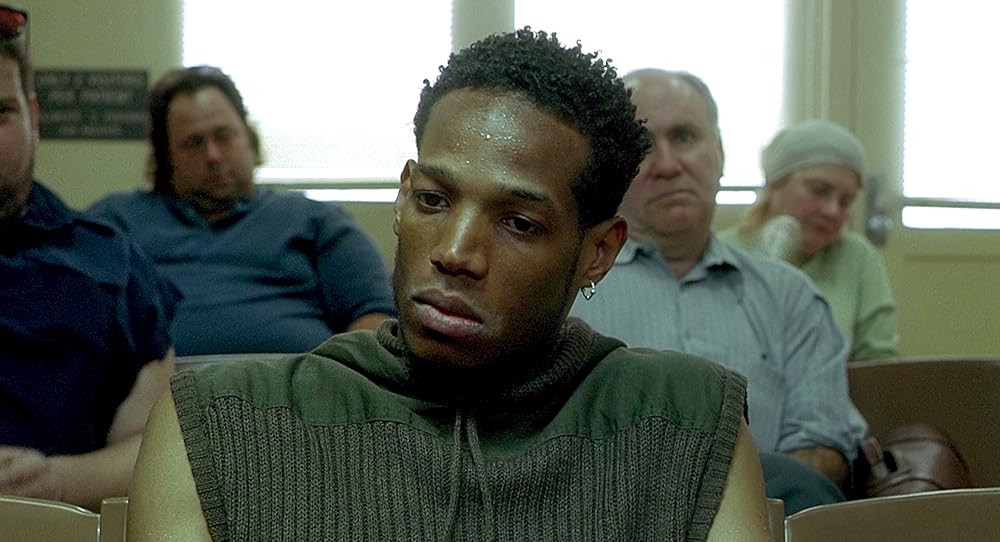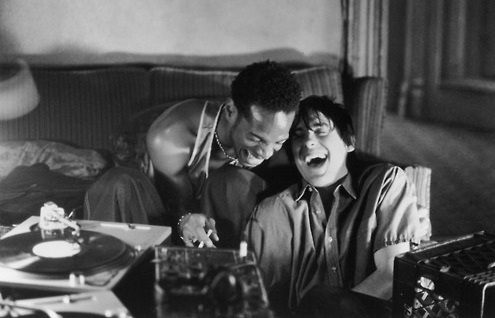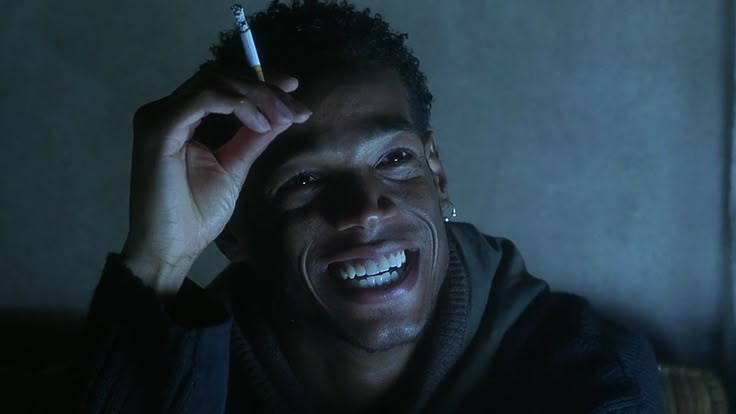Marlon Wayans' World [Unpublished Feature, 2000]
WORDS BY RAQIYAH MAYS

A neatly cropped brother tiptoes down the shiny marble hallway of New York’s Four Seasons Hotel. He smiles, whispering polite greetings to Gucci-clad passersby. Meanwhile, in a nearby lounge, an over-starched maestro strums calming rhythms as an ivory-plated piano follows his melody. The room’s mood is tastefully quiet, peacefully soothing. Then suddenly, “Yo!” emanates from the mouth of a wild-haired, Shaft-side-burned cat. As middle-aged Caucasian wine sippers flinch in typical Black-man fear, the blaring ghetto call echoes down the hotel’s mirrored corridor.
“What? I’m right here,” replies a petite brunette. Then, from around the corner, appears Marlon Wayans—looking as out of place as a raisin in milk. Rockin’ a pair of not-so-new, black-and-white Nikes and an oversized Phat Farm denim suit, he finds sight of his lost assistant and casually follows her to a small round table.
When it comes to blending in with the crowd, Marlon stands out like a sore thumb. He’ll talk crazy loud, yell obscenities and imitate white voices in a room packed with pale-faced rich folk. And that’s just his every-day personality. Likewise, when it comes to his comedy career, he has no problem with switching from the norm either.
This fall, Marlon takes on his first serious project, Requiem for a Dream, based on a novel by Hubert Selby Jr. He plays Tyrone, a heroin addict from Coney Island who sells drugs with his Italian best friend in hopes of bringing their drug-warped fantasies to reality. “The movie is about why we do [drugs],” explains Marlon while pouring tea through a small sifter. “It’s about the emotional voids in life that lead people to addictions.”
Similar to his current surroundings, Marlon is once again the dark spot in an otherwise colorless scenario. He’s the only Black face—save for his mostly absent love interest—in Requiem. But it’s not the hue of this young thespian’s skin that viewers will remember after seeing the film, it’s his convincingly disturbed and dark performance that will undoubtedly lead to future dramatic roles.
What differentiates Requiem from anything else Marlon has done before is that he leaves behind the buffoonery. He doesn’t do that trademark high-pitched Wayans scream. He doesn’t wear four permed ponytails like he did in Don’t Be a Menace…. And he leaves behind the strange body contortions and goofy faces of The 6th Man and Senseless. Instead, the emotionally draining plot of Requiem will show Marlon’s ashy mouth spew the green-colored symptoms of a heroin withdrawal. Put plain and simple: This film is no joke.
@vanityfair #MarlonWayans reveals how he developed his character for #RequiemforaDream and why the film is “the greatest drug PSA ever.” #jaredleto #jenniferconnelly #whitechicks #wayansbrothers #scarymovie ♬ original sound - Vanity Fair
“WHAT MAKES ROBIN WILLIAMS ILL TO ME IS HE CAN TAKE MATERIAL, ELEVATE IT, AND BRING COMEDY AND HEART TO IT. I’D LOVE TO BE HIM. NOT A BLACK ROBIN WILLIAMS BUT TO JUST BE ABLE TO DO GOOD COMEDIC ACTING.”
Considering his track record as a comedian, it came as quite a surprise to director Darren Aronofsky that someone like Marlon Wayans would even consider being a part of Requiem—especially since a huge paycheck wasn’t attached to the role. “Every single cent in the movie is on the screen,” he explains. “The only artists that got involved with the film were those who believed in the vision and wanted to help bring it [out]. Marlon said to me, ‘Look, I’m a performer but I want to be an actor, and I want to show people that I can be just that—an actor.’”
According to Aronofsky, Marlon probably spent more money to work on the project than he actually got paid. But unlike the rampant spending of other stars, Marlon is a simple man who doesn’t get caught up in materialistic things. “I could spend $100,000 on a Rolex,” he explains. “But if I took that [money] and put it in a mutual fund for 20 years, it’ll turn into $300,000, and now I can give that to my nieces and nephews for college. See, money matures, platinum depreciates.”
The passion that Marlon feels about performing is evident in his body language. Whenever he speaks about his craft, his large brown eyes light up with excitement. He’ll often lean his slender frame anxiously forward to the end of his seat and proudly explain the experience of acting. “I could’ve been in LA doing other things to make some cheddar, but I took the time, stayed in New York and got to know my character,” he says in reference to his frequent visits to drug rehabs in preparation for his Requiem role. “Everything [in this film] stems from emotions. That’s why I say this is a powerful movie, man. I know people that [saw it and] walked out shakin’ like, ‘This is sick.’” Mimicking the shivering of a strung-out crackhead, he adds, “It’s a total contrast from Scary Movie.”
With the $100 million-plus banking of this summer’s No. 1 comedy, Scary Movie, coupled with the success of his “1-800-Call-ATT” commercials and co-hosting the 2000 MTV Video Music Awards earlier this year, this 28-year-old entertainer is walking on cloud nine. Marlon’s workaholic struggle to acquire professional freedom is an addiction—much like the ones endured by the junkie he plays in Requiem—that keeps him coming back for more.

“Comedians make the best actors,” expounds Marlon. “What makes Robin Williams ill to me is he can take material, elevate it, and bring comedy and heart to it. I’d love to be Robin.” Then, giving his statement a second thought he continues: “I wouldn’t say a Black Robin Williams but, you know, to just be able to do good comedic acting.”
Marlon almost got to be Robin—well, sorta. In 1992, he was cast as the boy wonder in Batman Forever, but after a last minute change in directors, golden boy Chris O’Donnell stole the role from Marlon, who didn’t exactly match the skin tone and tights of the fictional caped sidekick. “I’m happy I took that route because I had some growing to do,” he says, shifting in his chair with a noticeable uneasiness in his voice. “I wasn’t ready for that shit. I’d have been coked out somewhere having ménages à trois with hooker midgets, because I wouldn’t have understood [the process]. But I’m a man now.”
The loss of the Batman role was a lesson in growth, and after five seasons, The Wayans Brothers cancellation seemed to be a class in sitcom maintenance. Plagued by bad writing for its first two years, Marlon contends that once he and older brother Shawn finally took control by hiring fresh production talent, the program took a turn for the better. “When the show started, people were hating it like, ‘Oh, that shit sucks.’ But by the third season, heads [opened up]. You gotta give shows a chance to develop,” he says. “We did our five-year run and maximized syndication value. They wanted us to take a pay cut but we wanted a raise. So we took what we learned there and applied it all to Scary Movie.”
Similar to the way The Wayans Brothers ended up not fitting into the WB’s fall schedule, episodes of not belonging have been a recurring theme in the life of Marlon Lamonte Wayans. As the youngest of 10 children growing up in Manhattan’s Fulton Projects—years spent living with pet roaches, wearing hand-me-down corduroys, and having a famous older brother named Keenen—Marlon was always the punch line of every kid’s comedy routine. “Niggas used to crack jokes like, ‘The only time you guys get new furniture is when Keenen come home,’ or, ‘Y’all don’t eat until Keenen come and buy juice,’” recalls Marlon. “I mean, it was true, but I got so much flack from the neighborhood about that—it was killing me.”
Even as the class clown at Laguardia High School of the Performing Arts and with best friends like Omar Epps, his former scene partner, Marlon was still considered an outcast. “I was the odd man out,” he says with a humble smile. “I was the funny guy [in school] with old-ass Reeboks, tight jeans and a I’m Gonna Git You Sucka jacket.”
“NI**AS USED TO CRACK JOKES LIKE, ‘THE ONLY TIME YOU GUYS GET NEW FURNITURE IS WHEN KEENEN COME HOME.’ I MEAN, IT WAS TRUE, BUT I GOT SO MUCH FLACK FROM THE NEIGHBORHOOD ABOUT THAT—IT WAS KILLING ME.”
Despite trying a little too hard to be cool throughout his childhood, Marlon knew as early as 5 years old that he wanted to perform. “I was the nigga that walked into the class and kids would go, ‘Oh, he’s gonna do something stupid. Watch,’” says Marlon, cupping his mouth and lowering his head like a child whispering a secret to another kid. But Marlon still remains clueless as to why he used to get in trouble at home. “I would bring home 95’s with [unsatisfactory notes] and Shawn would bring home 60’s and [satisfactory notes]. He wouldn’t get a spanking but I would. I never quite understood that.”
Shawn, however, offers his own explanation as to why Marlon had a sore booty growing up. “Sometimes Marlon does stuff without thinking. Like, he’ll be partying and there’ll be gun shots going off and he’s running toward the bullets,” he explains via phone from his LA residence. “But I prefer working with him because that’s when both of us are at our best. We’re our own best critics and we make each other perform on a level that we probably wouldn’t have been able to otherwise.”
Although Marlon admits that he enjoys working with his siblings, there are certain things, like Requiem, that he has to do on his own. “My work and my family will never leave,” he says. “But in order to love somebody, you gotta separate your journey together from your own personal journey. A lot of people perceive me as being silly and that’s understandable because I came into their living room and made ’em feel good on a day when they were upset. And for that I’m grateful. But whatever they think, I hope they judge me properly, ’cause only God can judge me.”

